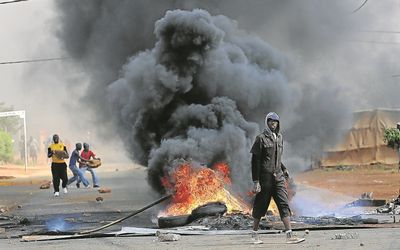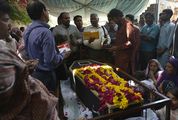Learn from Brazil — don’t imitate
by Geoff Blount,
2014-05-27 05:05:56.0
WHILE each country in the Brics group (Brazil, Russia, India, China and SA) is unique, parallels are often drawn between SA and Brazil. Both have high income inequality, high crime rates, sophisticated first-world sectors in parallel with underdeveloped third-world sectors, a history of dictatorial regimes, similar social problems and vast natural resources. Both suffer from a general social discontent and negativity with respect to the way they are managed — and their prospects.
With apparently similar problems, SA seems to be increasingly — and erroneously — looking to the Brazilian model for solutions. While we have much to learn from Brazil, SA is fundamentally different and it is worth discussing some of these soft differences.
First let me state that I am making simplified generalisations: Brazil is vast and diverse. It is a federation in which each state has a unique identity. In fact, it is larger than the continental US, and any generalisations will be countered by many exceptions.
Although not as expansive, SA is equally complex. The generalisations below are based on my experiences as a South African who has married into a wonderful Brazilian family and travelled frequently to Brazil for business and pleasure.
The most important differentiator is that Brazil has built a common national identity. Irrespective of race and class, there is a common community in language, custom, music, and social symbols. South Africans remain severely divided by all of these, although we came close to feeling unified during the Soccer World Cup.
South Africans host a permanent inferiority complex, in that "everything foreign is better" and we are "oh so third world". Ironically, this means we sometimes overcompensate and deliver better than first-world. Brazilians are almost the opposite. While aware of their shortcomings, the Brazilian attitude is that things are "sort of OK". While Brazilians like being Brazilian, in spite of their problems, South Africans suffer a roller coaster of emotions towards their country, swinging from despondence to exuberance.
Brazilians are settled in their country: they have found their groove and are comfortable with themselves. We have not. Brazilians are more inward-looking, possibly due to the size of their country, while South Africans are more outward focused. Ironically, Brazil has an assertive foreign policy, unlike the shy and sometimes morally weak policy of SA.
Individual Brazilians are much more entrepreneurial than South Africans. But our big companies excel on the global stage. Despite difficulties with regard to maintenance and development, South African infrastructure is superb relative to that of Brazil. Poor infrastructure is often referred to as "risco Brasil", the Brazil risk.
Brazil has only fought two wars — neither on its own soil — and even its dictatorship was relatively benign compared to SA’s experiences, or its neighbours Chile and Argentina. Although Brazil also has a high crime rate, it is not accompanied by the same violence as here. Our history is one of internal and external wars, confrontation and violence, reflected strongly in our society today.
South Africans are hypercritical of government. Failure or ineptitude in the government or a parastatal we (especially the affluent) take as a sign to emigrate. Brazilians aren’t surprised by failure or ineptitude and have learned to live with it. We expect our government to meet our ideals, and take it hard when it does not.
Brazil has worked hard through strong social policies, and effective implementation thereof, in tackling inequalities and poor education. We have not, and condemn our children, especially rural, to another generation of poverty through poor management of education.
South Africans push themselves. If we run, we don’t jog, we do the Comrades marathon. Brazilians are far more chilled. When they run, they jog along the beach and enjoy the view.
Neither Brazil nor SA has the ability to become a fast-growth economy such as China or India. Our structural problems are not being adequately addressed by our governments and we will remain low-growth emerging economies. Brazil’s recent economic successes were cyclical, rather than structural, as was ours up to 2008. It is a mistake to confuse their cyclical growth with structural growth.
In an economic sense, SA leads Brazil by five years. Our property and economic bubble burst in 2008; Brazil’s will follow. It could learn from us how to avoid five years of tepid growth.
Brazil’s recent growth had the tailwind of former president Fernando Henrique Cardoso’s market-friendly policies. His successor, Luis Inácio Lula da Silva, continued somewhat on that path, but incumbent Dilma Rousseff has stepped up intervention in the economy, worsening the slump. SA’s policy makers risk emulating Rousseff, having attributed Brazil’s recent successes to current policy. In reality, the drivers predated it. I fear Rousseff is dismantling these drivers. SA’s slump has been driven by similar increasing state intervention and micromanagement with often inconsistent and poor policy. (But our level of intervention still pales in comparison to Brazil’s.)
But we should learn from that country how to bring about social and economic upliftment, and how to improve education.
SA and Brazil are great countries with amazing opportunities and frightful challenges. We have much to learn from one another but rather than blindly emulating the Brazilian model, SA should cherry-pick its successes.
• Blount is CEO of Cannon Asset Managers.

DIFFERENCES: Bekkersdal residents during a service delivery protest. Brazilians expect less from their government than we do. Picture: THE TIMES
WHILE each country in the Brics group (Brazil, Russia, India, China and SA) is unique, parallels are often drawn between SA and Brazil. Both have high income inequality, high crime rates, sophisticated first-world sectors in parallel with underdeveloped third-world sectors, a history of dictatorial regimes, similar social problems and vast natural resources. Both suffer from a general social discontent and negativity with respect to the way they are managed — and their prospects.
With apparently similar problems, SA seems to be increasingly — and erroneously — looking to the Brazilian model for solutions. While we have much to learn from Brazil, SA is fundamentally different and it is worth discussing some of these soft differences.
First let me state that I am making simplified generalisations: Brazil is vast and diverse. It is a federation in which each state has a unique identity. In fact, it is larger than the continental US, and any generalisations will be countered by many exceptions.
Although not as expansive, SA is equally complex. The generalisations below are based on my experiences as a South African who has married into a wonderful Brazilian family and travelled frequently to Brazil for business and pleasure.
The most important differentiator is that Brazil has built a common national identity. Irrespective of race and class, there is a common community in language, custom, music, and social symbols. South Africans remain severely divided by all of these, although we came close to feeling unified during the Soccer World Cup.
South Africans host a permanent inferiority complex, in that "everything foreign is better" and we are "oh so third world". Ironically, this means we sometimes overcompensate and deliver better than first-world. Brazilians are almost the opposite. While aware of their shortcomings, the Brazilian attitude is that things are "sort of OK". While Brazilians like being Brazilian, in spite of their problems, South Africans suffer a roller coaster of emotions towards their country, swinging from despondence to exuberance.
Brazilians are settled in their country: they have found their groove and are comfortable with themselves. We have not. Brazilians are more inward-looking, possibly due to the size of their country, while South Africans are more outward focused. Ironically, Brazil has an assertive foreign policy, unlike the shy and sometimes morally weak policy of SA.
Individual Brazilians are much more entrepreneurial than South Africans. But our big companies excel on the global stage. Despite difficulties with regard to maintenance and development, South African infrastructure is superb relative to that of Brazil. Poor infrastructure is often referred to as "risco Brasil", the Brazil risk.
Brazil has only fought two wars — neither on its own soil — and even its dictatorship was relatively benign compared to SA’s experiences, or its neighbours Chile and Argentina. Although Brazil also has a high crime rate, it is not accompanied by the same violence as here. Our history is one of internal and external wars, confrontation and violence, reflected strongly in our society today.
South Africans are hypercritical of government. Failure or ineptitude in the government or a parastatal we (especially the affluent) take as a sign to emigrate. Brazilians aren’t surprised by failure or ineptitude and have learned to live with it. We expect our government to meet our ideals, and take it hard when it does not.
Brazil has worked hard through strong social policies, and effective implementation thereof, in tackling inequalities and poor education. We have not, and condemn our children, especially rural, to another generation of poverty through poor management of education.
South Africans push themselves. If we run, we don’t jog, we do the Comrades marathon. Brazilians are far more chilled. When they run, they jog along the beach and enjoy the view.
Neither Brazil nor SA has the ability to become a fast-growth economy such as China or India. Our structural problems are not being adequately addressed by our governments and we will remain low-growth emerging economies. Brazil’s recent economic successes were cyclical, rather than structural, as was ours up to 2008. It is a mistake to confuse their cyclical growth with structural growth.
In an economic sense, SA leads Brazil by five years. Our property and economic bubble burst in 2008; Brazil’s will follow. It could learn from us how to avoid five years of tepid growth.
Brazil’s recent growth had the tailwind of former president Fernando Henrique Cardoso’s market-friendly policies. His successor, Luis Inácio Lula da Silva, continued somewhat on that path, but incumbent Dilma Rousseff has stepped up intervention in the economy, worsening the slump. SA’s policy makers risk emulating Rousseff, having attributed Brazil’s recent successes to current policy. In reality, the drivers predated it. I fear Rousseff is dismantling these drivers. SA’s slump has been driven by similar increasing state intervention and micromanagement with often inconsistent and poor policy. (But our level of intervention still pales in comparison to Brazil’s.)
But we should learn from that country how to bring about social and economic upliftment, and how to improve education.
SA and Brazil are great countries with amazing opportunities and frightful challenges. We have much to learn from one another but rather than blindly emulating the Brazilian model, SA should cherry-pick its successes.
• Blount is CEO of Cannon Asset Managers.























Change: -0.47%
Change: -0.57%
Change: -1.76%
Change: -0.34%
Change: 0.02%
Data supplied by Profile Data
Change: -1.49%
Change: -0.01%
Change: -0.47%
Change: 0.00%
Change: -0.08%
Data supplied by Profile Data
Change: 0.61%
Change: 0.85%
Change: 0.20%
Change: -0.22%
Change: 0.82%
Data supplied by Profile Data
Change: 0.27%
Change: -0.42%
Change: 0.13%
Change: -1.22%
Change: -1.88%
Data supplied by Profile Data